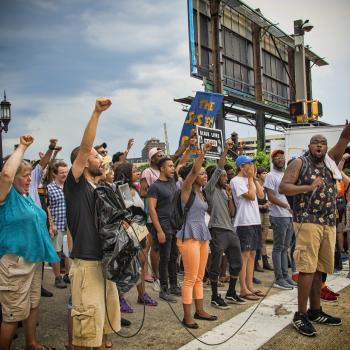Recent events in Ferguson, Missouri, New York City, and now Phoenix, Arizona have shown black people killed by white police officers. There have also been protests (and in some cases, riots) over the acquittal of the white officers. What you choose to focus on can tell you a lot about your own awareness of racism. Do you focus on the injustice that has occurred when police officers have been acquitted of their crimes? Or do you focus on the protests and riots, complaining about how those people are destroying their communities? In my opinion, if you focus on the latter, you are likely refusing to see the problem that faces all of us: What are we to do about the systemic racism that is built into this country?
When I consider this question, there are no easy answers that come to mind. Systemic racism is pervasive in this country. What I do know is that all of us, regardless of our skin color, can’t continue to ignore the racism that is part of this country. As a white person, I think it is important to continue to educate myself on white privilege, critical race theory, and micro-aggressions. However, education is just a start. What must really be done involves applying what is learned to my own behavior and, just as importantly, doing whatever I can to be an ally to people of color.
Systemic racism isn’t something that will be changed overnight, as is evidenced by the history of this country and its treatment of people of color. What you can do, though, is to fully acknowledge that racism exists and that if you’re a white person, you are racist. It may not be a conscious form of racism, but you can still be racist and not cognitively recognize it. Now is the time to start recognizing it, to recognize the micro-aggressions that show up in your behavior, or the assumptions that show up in your thoughts about people of color. What you can also do is acknowledge that you have privilege, that the experiences you have with the police are not the experiences a person of color has with them. You can acknowledge that you don’t face the same challenges a person of color faces in everyday life. Most importantly, you can listen to the people of color you know. I mean really listen. Don’t tell them you aren’t racist. Don’t get defensive. Just listen and when you feel reactions come up, sit with them and ask yourself what’s really causing you to react the way you want to react.
You can also be an ally to people of color. Being an ally involves calling out the racism and saying enough is enough. It involves supporting people of color as they make their voices heard. It involves supporting the organizations that advocate for people of color. It also involves not making the conversation about you, but instead keeping it focused on where it really matters: #blacklivesmatter. Part of being an ally involves having courageous conversations about what has happened with your friends, family, neighbors, etc. We need to talk about the recent events and the real issues involved instead of burying our heads in the sand. The conversations won’t be easy, but if we don’t have them, we will perpetuate the system of racism that has caused cops to be acquitted of murders.
Racism is part of our lives. It’s time we acknowledge that and start working to change it. The change won’t be easy, but if we want to espouse values such as freedom and equality, then we need to actually make those values part of our lives and part of the actions we take. We make those values part of our lives by exposing racism in its various forms and working toward creating true equity, wherein race is recognized as a factor that affects how people treat each other. When we address racism in this manner, we will face resistance, but we will also make it harder for racism to flourish and eventually perhaps even stop its perpetuation altogether.
Black lives matter. Racism matters. It’s time to stop pretending otherwise.
Socially Responsible Magic is published on alternate Wednesdays. Subscribe via RSS or e-mail!

















